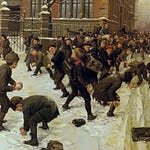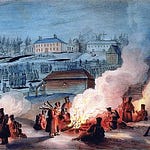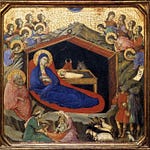Advent is here, and so are our Christmas offers at Word & Song!
Now through Epiphany new paid, gift, and upgraded subscriptions are 25% off.
Paid subscribers see a special gift offer at the very bottom of this page.
Said John, when the Pharisees kept pressing him to tell them who he was, “I am the voice of one crying in the wilderness, Make straight the way of the Lord, as said the prophet Isaiah.”
And there is our Word of the Week — voice. Other animals make sounds, and the sounds have meanings, as signals; but not as signs that the mind fashions, arranges, plays with, meditates upon, changes, joins and disjoins, and upon which we stamp the impress of our inmost beings. Think of the human voice. It fascinated me, when I was a senior at Princeton, in the good Harry Solo’s course in The History of the English Language, to learn about the manifold and subtle mechanics we use to make sounds that carry meaning. What are the lips doing? The tongue? The vocal cords? The breath? Where is the tongue placed? Have we blocked up the oral cavity? Is the nasal passage free? Some sounds are so foreign to English speakers, the only way I can learn to make them is to be told exactly what these various organs of pronunciation are doing. It’s like the LL in Welsh — an unvoiced L. The nearest I can come to it is to say, “Put your tongue in the position to make a bright dental L, just like a little kid saying ‘lollipop,’ but don’t let your vocal cords vibrate. Just let the air come out from the sides of your mouth.” When you hear it, you’ll understand why English speakers misheard the name LLWYD as FLOYD. And only an American can really imitate the TH in a working-class Brooklyn accent, as somewhere between THIS and DIS. But I’ll describe it this way: put your tongue in place to say TH in THIS, but block up the oral cavity so that the air finally explodes. In linguistic terms, the sound is called a plosive or a stop, such as English has in B, D, G, P, T, K. Can you hear it? Hey, this — “dis”? — is fun!
But I have not even touched the mystery of the human voice. We all know there’s more to it than mechanics. One of the odd things I’ve noticed about boys: they are natural mimics. Every boy I knew did impersonations, sometimes a lot of them, sometimes a few, sometimes well, sometimes not so well. Who knows? Maybe the sex that did the hunting of birds and wild beasts had to have some edge in hearing and imitating. But we know that when you imitate a human being, you try to pour into it a whole personality, a way of being. It’s not just what the voice sounds like, but what the person says, and how, and why; with which passions, with what intent. A human voice, like the human eyes, is steeped in that abyss of personhood. Dietrich von Hildebrand once said that the gap between personal and impersonal in living creatures was as wide as the gap between the animate and the inanimate. Here our good friend the dog, to use C. S. Lewis’ happy saying, trembles upon the brink of personality: the dog hears his master’s voice. Our dog Jasper, of most happy memory, would run to the telephone whenever it rang, but only if I had gone away on a trip. He wanted to hear my voice. And I’d say, “Put Jasper on the phone!” And I’d talk to him, and give him the command, “Talk!” — at which he would make gurgle-sounds, not like the short sharp bark he used when I’d say, “Speak!”
The voice fascinates me. We recognize that voices run in families, mostly because the musical instruments — shape of mouth and oral cavity, shape of nose, length of neck, thickness of lips and tongue and so on — resemble one another. But what about the voice of God? “If today you hear his voice,” says the Psalmist, “harden not your hearts.” The voice of God trembles in the human soul, not on the tympanum in the ear; but many of the saints have heard, as with the ear, that voice speaking with a ringing clarity that human voices do not possess. The Hebrew prophet — and John the Baptist was one — was a speaker for God, a living instrument of human personality. Can you impersonate a prophet? Did the boys who jeered at Jeremiah when he was thrown into the cistern, and I’m dead sure there were such, mock him by imitating his human voice?
The word voice comes into English through the Norman French, as do almost all of our words with that oi sound in them, which we have preserved but which has been lost since in most French words: join, foil, oil, coin. The French word came from Latin vox, itself a descendant of the Indo-European root wekw-, meaning to speak. But in the Hellenic branch of our family, kw-, pronounced with rounded lips, became p(w)-, also pronounced with rounded lips; and in most of that Hellenic branch, initial w- disappeared. The result is that wekw- became ep(w)-, as in Greek epos: a speaking, a promise, a song, and eventually, an epic song. I find this quite satisfying: the true epic was being uttered not in Greece, then in cultural decline, but by a son of Israel clad in camel skin, eating locusts and wild honey, crying out, “Repent, for the kingdom of God is at hand.”
Listen to this episode with a 7-day free trial
Subscribe to Word & Song by Anthony Esolen to listen to this post and get 7 days of free access to the full post archives.












